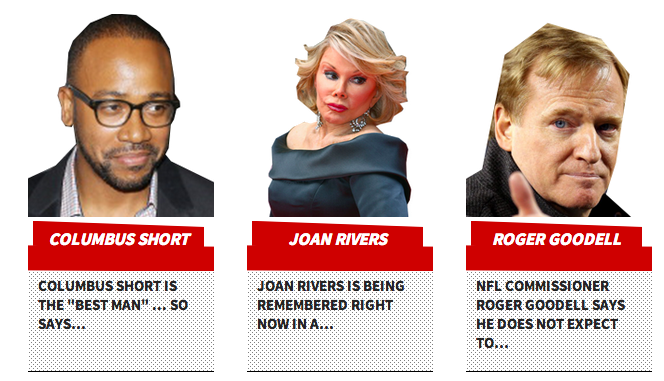Thank God for TMZ. In the course of the past year, the digital celebrity tabloid has leapfrogged police, prosecutors, and investigative reporters to become the sports world’s most dedicated watchdog. In November, the site broke the story that Florida State quarterback Jameis Winston had been accused of sexual assault. (A year before TMZ’s story hit, the local police force’s slapdash investigation petered out quietly; TMZ’s scoop inspired serious scrutiny of both Winston and the cops.) In April, TMZ aired audiotapes revealing Los Angeles Clippers owner Donald Sterling making casually racist comments about players and fans. (Sterling’s tenants and employees had been accusing him of racial discrimination for years; TMZ’s tapes finally forced the NBA to push Sterling out.) On Monday, the site published a video of Baltimore Ravens running back Ray Rice punching his fiancée in the face and dragging her unconscious body out of a casino elevator. (Before the leak, New Jersey prosecutors gave Rice a cushy plea deal and the NFL slapped him lightly on the wrist; the video compelled the Ravens to cut Rice from the team.) And today—after beating the New York Times itself to each of these stories—TMZ gets its due in the form of a Times profile heralding its work as a necessary “rebellion against the established social order.”
The tabloid’s day-to-day sports coverage is itself vaguely offensive. (“Adrian Peterson – THE SPERMINATOR!” one recent story reads. “Chalk up yet ANOTHER baby mama for the Minnesota Vikings star.”) When the site takes on domestic violence, institutional racism, and sexual assault, it aims to titillate, too—the Rice story is titled “Ray Rice ELEVATOR KNOCKOUT—Fiancee Takes Crushing Punch”—but the central outrage is far from faux. And when its reporters aren’t hitting below the belt, they’re punching up: TMZ’s scandal coverage reaches above the big-name stars themselves to go after the colleges, cops, prosecutors, and sports leagues that have failed to investigate these incidents with TMZ’s swiftness or punish them with the site’s intensity. After breaking the Winston story, TMZ reported that Florida cops only notified the State Attorney’s Office of the incident after TMZ started asking questions about the year-old accusation; TMZ later contributed more on-the-ground reporting to demonstrate how police inaction in the case had led to lost evidence. And when NFL commissioner Roger Goodell claimed that authorities with the NFL failed to see the Rice elevator tape because the only “credible” source of the evidence—law enforcement officials—wouldn’t cough it up, TMZ razzed Goodell for his reasoning. “The police got the tape from the casino, so the police video CANNOT be more credible than the source,” TMZ countered. (It was speaking from experience—it obtained the tape from former casino workers, not authorities.) Goodell’s face now appears on TMZ’s running list of embattled celebrities.
What makes TMZ so effective? Unlike prosecutors (who hedge their bets to ensure they only prosecute people who juries will convict) and league officials (who are invested in selling athletes as heroes), TMZ has an economic imperative to administer uncompromising takedowns. And unlike traditional journalistic outlets, it’s willing to pay for tips, tapes, and documents to back them up. (As the Times notes, TMZ traffics in proof, not just gossip.) TMZ’s model also keeps pace with developing technologies, which encourage consumers to constantly surveil themselves and others; the result are videos and tapes of private incidents that otherwise would have been neutralized by he-said-she-said posturing. But TMZ’s success is also due to a shift in how the public consumes tabloids. Sites like Jezebel—which lifts celebrity gossip out of the pages of Us Weekly, then filters it with its own progressive bent—have revealed an audience of internet readers who are eager to wed their pop cultural interests to their social justice priorities. At its best, TMZ co-opts the sports world’s star machine to reveal deeper scandals about how society still privileges the rich, the famous, and—more often than not—the male.
At this point, it looks like the only people who can undermine TMZ’s dominance are its disgraced subjects themselves. After TMZ’s tapes unseated Donald Sterling, Atlanta Hawks owner Bruce Levenson privately contacted the NBA in July to admit that, two years ago, he had sent off a racist email claiming that the team’s black fans had “scared away the whites,” complaining that the Kiss Cam is “too black,” and requesting “some white cheerleaders.” NBA commissioner Adam Silver says Levenson immediately offered to sell the team; in a statement, Levenson has positioned himself ahead of the scandal, saying, “If you’re angry about what I wrote, you should be. I’m angry at myself too.” I bet TMZ is mostly mad that Levenson beat it to the story—anger that will fuel its next takedown of a worthy target.
